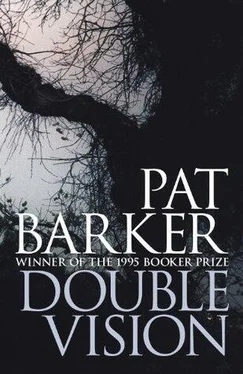He nodded, watching her intently, rocking the whisky from side to side in the glass, amber lights darting across his fingers. He had big hands.
She sensed he was desperate for work, that chopping veg and loading dishes might be looming, so she didn’t bother making the hours attractive. Eight till four, five days a week. Saturday mornings would be great if he could manage it. ‘And I’ll pay whatever Fred paid. Is that all right?’
‘Fine.’ He looked at her — perhaps he sensed desperation too. ‘You haven’t said what you want me to do.’
‘Driving, lifting, making an armature…’ She waited.
‘I know what it is. I’ve never made one.’
‘I’ll show you.’ It hurt her to say it, to think of other hands on her work. ‘I can’t do it.’
‘Alec said it’s a statue of Christ. How big?’
‘Fifteen feet.’
‘ Fifteen? ’
‘Yep.’
He was looking at her, assessing the extent of her disability. ‘How high can you raise your arm?’
She pulled a face. ‘Shoulder height.’
‘You’ll need a scaffold. I can’t see you shinning up a stepladder’ — he nodded at her stick — ‘with that.’
‘Could you make one?’
‘Yeah, it’s not difficult.’
‘You’re sure?’
‘Yeah, no problem. Anyway, I’ll bounce up and down on it first, so if anybody breaks their neck it’ll be me.’
‘Might be as well.’ She smiled. ‘I don’t think my neck could take any more.’
‘How long do you have to wear the collar?’
‘Another month at least.’
‘But you will get the mobility back?’
‘So they say.’
A pause. ‘So how shall we leave it?’ he asked. ‘Do you want to check with Fred first?’
‘No, I need to get started. How about tomorrow?’
‘Are you sure you’re well enough?’
‘I’ve got to be.’
‘Well, if you don’t feel up to doing much, I can always be making a start on the scaffolding.’
She felt relieved beyond measure. It had all happened so quickly, so easily. Her first job tomorrow morning must be to ring Alec and thank him. It was a bit late tonight, she thought, glancing at her watch.
Immediately, Peter put his glass on the table and stood up. ‘No, don’t get up,’ he said, seeing her reach for her stick. ‘I can let myself out.’
She heard him pulling on his boots, grunting with the effort, and then went to the window to watch him go. The security light flicked on again as he crossed the beam. He seemed to sense her watching and without turning round raised his hand as he disappeared into the dark tunnel of rhododendrons.
A moment later she heard the car start. The noise was distorted, as every noise here was, by the wall of trees. He reversed, turned, and then she heard the hum of the engine diminishing into the distance before being swallowed up by night and silence. Then there were only the trees, and a few flakes of snow shuddering on the black air.
The following morning, after seeing Peter start work on the scaffold, Kate accepted Angela’s offer of a lift into the village and went to see Alec Braithewaite.
It was a cold, clear day, the grass around the headstones rimed with frost. A trail of muddy, trampled snow led up to the rectory door. She rang the bell and heard it clang deep inside the house, a vast, draughty Georgian mausoleum of a place. She wondered why Alec didn’t protest to the bishop and insist on being given somewhere more sensible to live. Justine was only left at home because the wretched glandular fever had kept her back for an extra year, and Kate found it impossible to imagine what it would be like for one person living here alone.
Justine’s mother, Victoria, had left eight years ago, in a scandal that rocked the parish, though as far as Kate knew no other man had been involved. Alec, pursuing her down the garden path, was supposed to have asked, as she heaved her suitcases into the waiting taxi, ‘Is there anybody else?’
‘Yes!’ Victoria had roared, at the top of her voice for the whole village to hear. ‘ Me .’
Angela deplored this behaviour, which she regarded as unforgivably selfish. Kate secretly applauded. Everybody had thought that Alec would leave the parish as soon as another living could be found, but he’d elected to stay, mainly for Justine’s sake — the local girls’ high school had an excellent reputation and Justine had been very happy there. But she’d now left school, and Alec still showed no inclination to move on, though he often talked wistfully about his desire to do more obviously valuable work in some inner-city parish. Like opening his door in the middle of the night to kids off their heads on crack, Kate thought. He was probably safer here. She rang the bell again. The last time she’d spoken to him about his plans he’d seemed to feel guilty that his life had settled into an undemanding groove, ministering to the spiritual needs of what Angela called ‘green-wellie Christians’ — weekenders who wouldn’t have dreamt of attending church in the city, but who in the country dropped in to morning service on their way to the Rose and Crown, as if — Angela again — God was thrown in as a job lot with Labradors and waxed jackets.
There were the locals, of course, but they turned up only two or three times a year: Easter, perhaps, Harvest Festival and the Christmas carol service. All dates at or near the main pagan festivals, as Alec cheerfully pointed out. She rang the bell again, thinking she might as well be waiting for some little Victorian maid ninety years dead to get up from her grave and answer the door.
Instead she heard the slap of bare feet on lino. A disgruntled voice called, ‘All right. I’m coming.’
The door opened and there was Justine, flushed from sleep, big-breasted inside a too-tight Snoopy T-shirt, yawning, showing the pink cavernous interior of her mouth as uninhibitedly as a cat. ‘Dad’s in the church, I think. Do you want to come in and wait?’
Looking at Justine’s bare feet on the coconut mat, Kate said, ‘No, it’s OK, thanks. I’ll have a walk across.’
She trod carefully across the cattle grid at the entrance to the churchyard — put in, at some expense, to contain the sheep — clinging to the railings because there was nowhere to put her stick. She missed the mournful clanking of the sheep’s bells as they moved between the graves. Slowly, carefully, up the path, one step at a time. It was a struggle to turn the iron ring and push the heavy door open. That didn’t bode well — she must be weaker than she thought. She shuffled, in her new three-legged state, into the cold, hassock-smelling interior, with its fugitive glints of multicoloured light on the stone flags.
Alec was kneeling at the altar rail. He didn’t look round as she closed the door quietly behind her.
A sulky central-heating system, just turned off after Holy Communion, distributed the smell of warm dust evenly around the church, without making any noticeable difference to the temperature. Shivering, she looked up at the crucifix above the chancel arch and beyond that at the rose window: Christ in Majesty, surrounded by concentric circles of apostles, angels, prophets, patriarchs and saints. At the moment she hated all representations of Christ, impartially and with great venom. If they were good, they underlined the folly of her thinking that she had anything new to contribute to a tradition that had lasted 2,000 years. If they were bad — like the painting in the Lady Chapel of Christ in a chiffon nightie, its diaphanous folds failing to hide the fact that there was nothing to hide — they seemed to invite her mockingly to add to their number.
She tiptoed down the aisle, away from Alec, who had still not looked up, and concentrated on the engravings of Green Men that decorated the roof bosses. What faces: savage, angry, tormented, desperate, sly, desolate. She’d noticed them first at Ben’s funeral and had been paying them regular visits ever since. Images of the Green Man were everywhere these days. A secular world sifting through pagan images, like a rag-and-bone man grubbing about for something — anything — of value. A symbol of renewal, people said, but only because they didn’t look. Some of these heads were so emaciated they were hardly more than skulls. Others vomited leaves, their eyes staring, panic-stricken above the choking mouth. No, she thought, wincing with pain as she craned to look at them, they were wonderfully done — some anonymous craftsman’s masterwork — but they were figures of utter ruin.
Читать дальше












